Best Online Master’s in Nursing (MSN) Programs for 2024
The demand for nurses has been impossible to ignore in recent years, while nurses looking to advance their careers need to acquire new skills—and often while still working full-time. That’s why Fortune set out to rank online master’s degree programs in nursing. In total, we ranked 44 online MSN programs. This ranking was last updated August 2022.
M.S. in Nursing Online at St. John Fisher University
Earn an M.S. in Nursing Online at the Wegmans School of Nursing
Designed for RNs with a bachelor’s degree in nursing and RN license, the online M.S. in Nursing pathway from St. John Fisher University prepares you to pursue licensure as an NP.
Jetzt mehr erfahrenOnline MS in Nursing From Georgetown University
Earn Your Master’s in Nursing Online From Georgetown University
Nursing@Georgetown delivers Georgetown University’s MS in Nursing program online, preparing RNs with a BSN to pursue certification in an APRN specialty. Students can earn their degree in as few as 23 months.
Jetzt mehr erfahren
1. University of Nevada--Las Vegas
Las Vegas, NVThe University of Nevada--Las Vegas doesn’t require applicants to submit GRE scores for its online master’s degree in nursing program. Prospective students are required to submit three letters of recommendation and international applicants are required to submit TOEFL scores. Last year, students accepted to this program had a 3.62 undergraduate GPA, on average. The retention rate for the program was 89.4% in 2021.
| Retention rate | 89% |
| Credits required to graduate | 33 to 46 |
| Acceptance Rate | 50.30% |
| Enrolled | 111 |
| Tuition | $314 per credit |
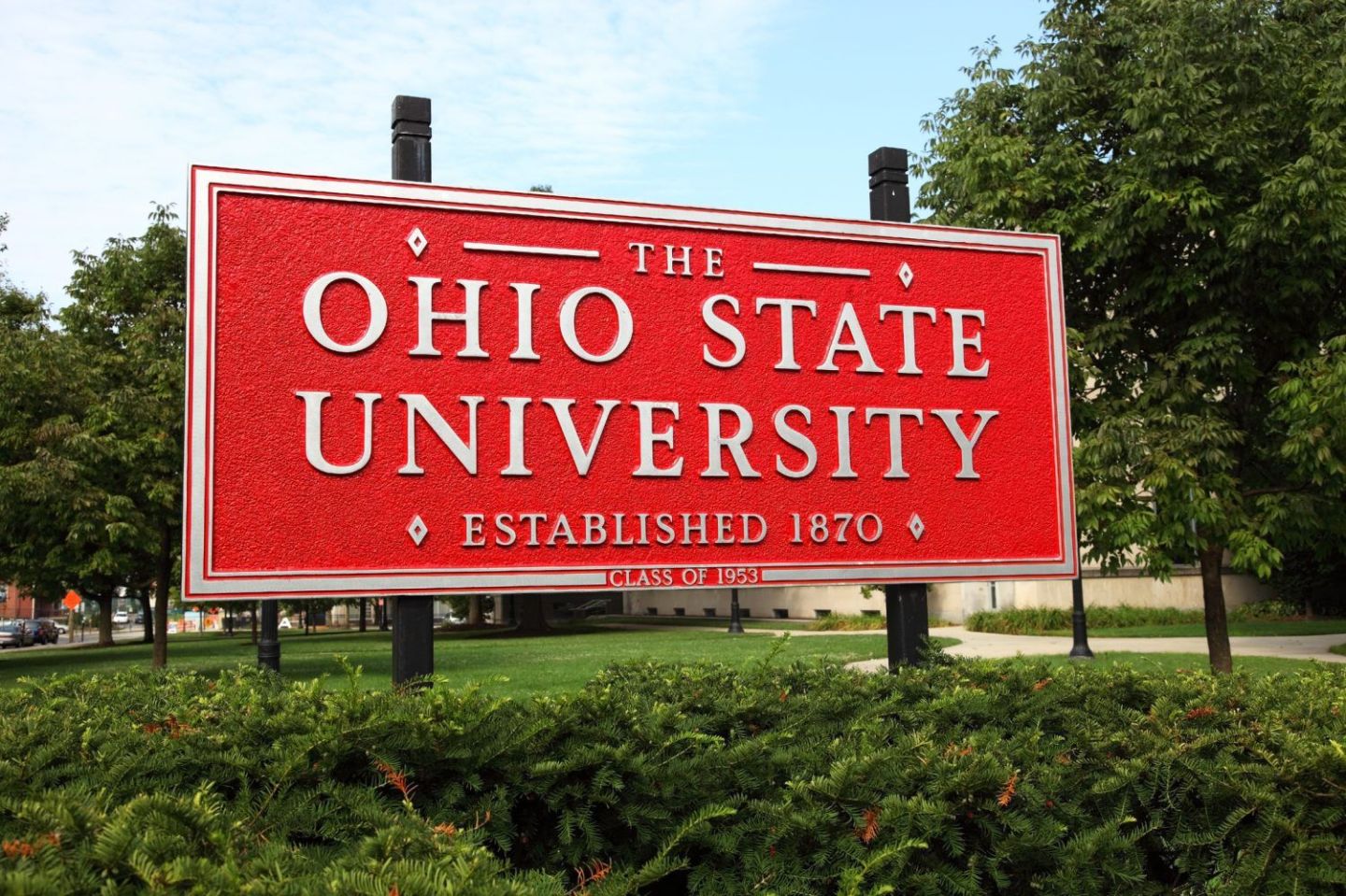
2. The Ohio State University
Columbus, OHThe Ohio State University doesn’t require applicants to submit GRE scores for its online master’s degree program in nursing. Prospective students are required to submit three letters of recommendation and international applicants are required to submit TOEFL scores. Last year, students accepted to this program had a 3.5 undergraduate GPA, on average. The retention rate for the program was 95% in 2021 and students must complete 42 credit hours to graduate.
| Retention rate | 95% |
| Credits required to graduate | 42 |
| Acceptance Rate | 43% |
| Enrolled | 232 |
| Tuition | $27,600.00 |

3. Georgetown University
Washington, DCGeorgetown University doesn’t require applicants to submit GRE scores for its online master’s degree program in nursing. Prospective students are required to submit three letters of recommendation. Last year, students accepted to this program had an average undergraduate GPA of 3.43. The retention rate for the program was 85% in 2021.
| Retention rate | 85% |
| Credits required to graduate | 40 to 49 |
| Acceptance Rate | 51.1% |
| Enrolled | 625 |
| Tuition | $2358 per credit |
Advance Your Career With Nursing@Simmons
Earn Your MSN and Become an FNP or PMHNP Online From Simmons University
Choose from two program options — FNP or PMHNP — and prepare to raise the standard of patient care. Explore Nursing@Simmons programs for RNs who hold a BSN or bachelor’s degree.
Jetzt mehr erfahren
4. Texas Tech University
Lubbock, TXTexas Tech University doesn’t require applicants to submit GRE scores for its online master’s degree program in nursing. Prospective students are required to submit two letters of recommendation and international applicants are required to submit TOEFL scores. Last year, students accepted to this program had a 3.51 undergraduate GPA, on average. The retention rate for the program was 92.91% in 2021.
| Retention rate | 93% |
| Credits required to graduate | 36 to 51 |
| Acceptance Rate | 59.5% |
| Enrolled | 624 |
| Tuition | $6,360.00 |

5. Duquesne University
Pittsburgh, PADuquesne University doesn’t require applicants to submit GRE scores for its online master’s degree program in nursing. Prospective students are required to submit two letters of recommendation and international applicants are required to submit TOEFL scores. Last year, students accepted to this program had an average undergraduate GPA of 3.53. The retention rate for the program was 99% in 2021.
| Retention rate | 99% |
| Credits required to graduate | 30 |
| Acceptance Rate | 62% |
| Enrolled | 327 |
| Tuition | $1,635 per credit |

6. University of Pittsburgh
Pittsburgh, PAThe University of Pittsburgh does require applicants to submit GRE scores for its online master’s degree in nursing program. Prospective students are required to submit three letters of recommendation and international applicants are required to submit TOEFL scores. Last year, students accepted to this program had an average undergraduate GPA of 3.67. The retention rate for the program was 75% in 2021.
| Retention rate | 75% |
| Credits required to graduate | 39 |
| Acceptance Rate | 65% |
| Enrolled | 33 |
| Tuition | $14,134.00 |

7. University of North Carolina--Charlotte
Charlotte, NCThe University of North Carolina--Charlotte doesn’t require applicants to submit GRE scores for its online master’s degree in nursing program. Prospective students are required to submit three letters of recommendation and international applicants are required to submit TOEFL scores. Last year, students accepted to this program had a 3.8 undergraduate GPA, on average. The retention rate for the program was 90.5% in 2021.
| Retention rate | 91% |
| Credits required to graduate | 36 to 38 |
| Acceptance Rate | 79% |
| Enrolled | 88 |
| Tuition | $1,200 per credit |
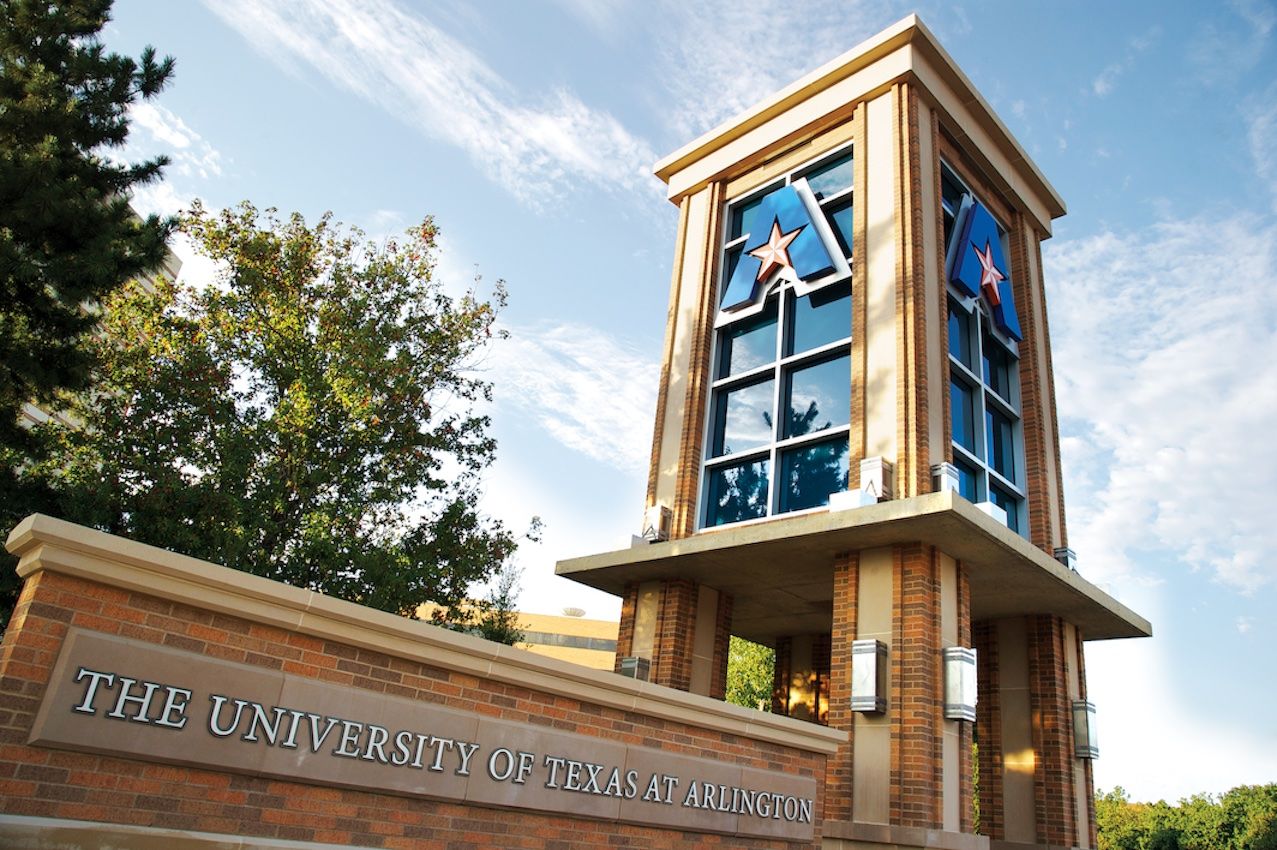
8. University of Texas--Arlington
Carson, CAThe University of Texas--Arlington doesn’t require applicants to submit GRE scores for its online master’s degree program in nursing unless the applicant’s undergraduate GPA is lower than 3.0. Prospective students aren’t required to submit any letters of recommendation and international applicants are required to submit TOEFL scores. Last year, students accepted to this program had a 3.534 undergraduate GPA, on average. The retention rate for the program was 76.12% in 2021.
| Retention rate | 76% |
| Credits required to graduate | 31 to 45 |
| Acceptance Rate | 65% |
| Enrolled | 4125 |
| Tuition | $10,000.00 |
M.S. in Nursing Online at St. John Fisher University
Earn an M.S. in Nursing Online at the Wegmans School of Nursing
Designed for RNs with a bachelor’s degree in nursing and RN license, the online M.S. in Nursing pathway from St. John Fisher University prepares you to pursue licensure as an NP.
Jetzt mehr erfahren
9. East Tennessee State University
Johnson City, TNEast Tennessee State University doesn’t require applicants to submit GRE scores for its online master’s degree program in nursing. Prospective students are required to submit three letters of recommendation. Last year, students accepted to this program had an average undergraduate GPA of 3.46. The retention rate for the program was 76% in 2021.
| Retention rate | 76% |
| Credits required to graduate | 42 to 51 |
| Acceptance Rate | 47% |
| Enrolled | 176 |
| Tuition | DNP |

10. East Carolina University
Greenville, NCEast Carolina University doesn’t require applicants to submit GRE scores for its online master’s degree program in nursing. Prospective students are required to submit three letters of recommendation and international applicants are required to submit TOEFL scores. Last year, students accepted to this program had a 3.4 undergraduate GPA, on average. The retention rate for the program was 93% in 2021.
| Retention rate | 93% |
| Credits required to graduate | 40 |
| Acceptance Rate | 57.5% |
| Enrolled | 245 |
| Tuition | $388 per credit |

11. University of Central Florida
Orlando, FLThe University of Central Florida doesn’t require applicants to submit GRE scores for its online master’s degree program in nursing. Prospective students are required to submit three letters of recommendation and international applicants are required to submit TOEFL scores. Last year, students accepted to this program had a 3.5 undergraduate GPA, on average. The retention rate for the program was 100% in 2021 and students must complete 31 credit hours to graduate.
| Retention rate | 100% |
| Credits required to graduate | 31 |
| Acceptance Rate | 66% |
| Enrolled | 205 |
| Tuition | $5,040.00 |
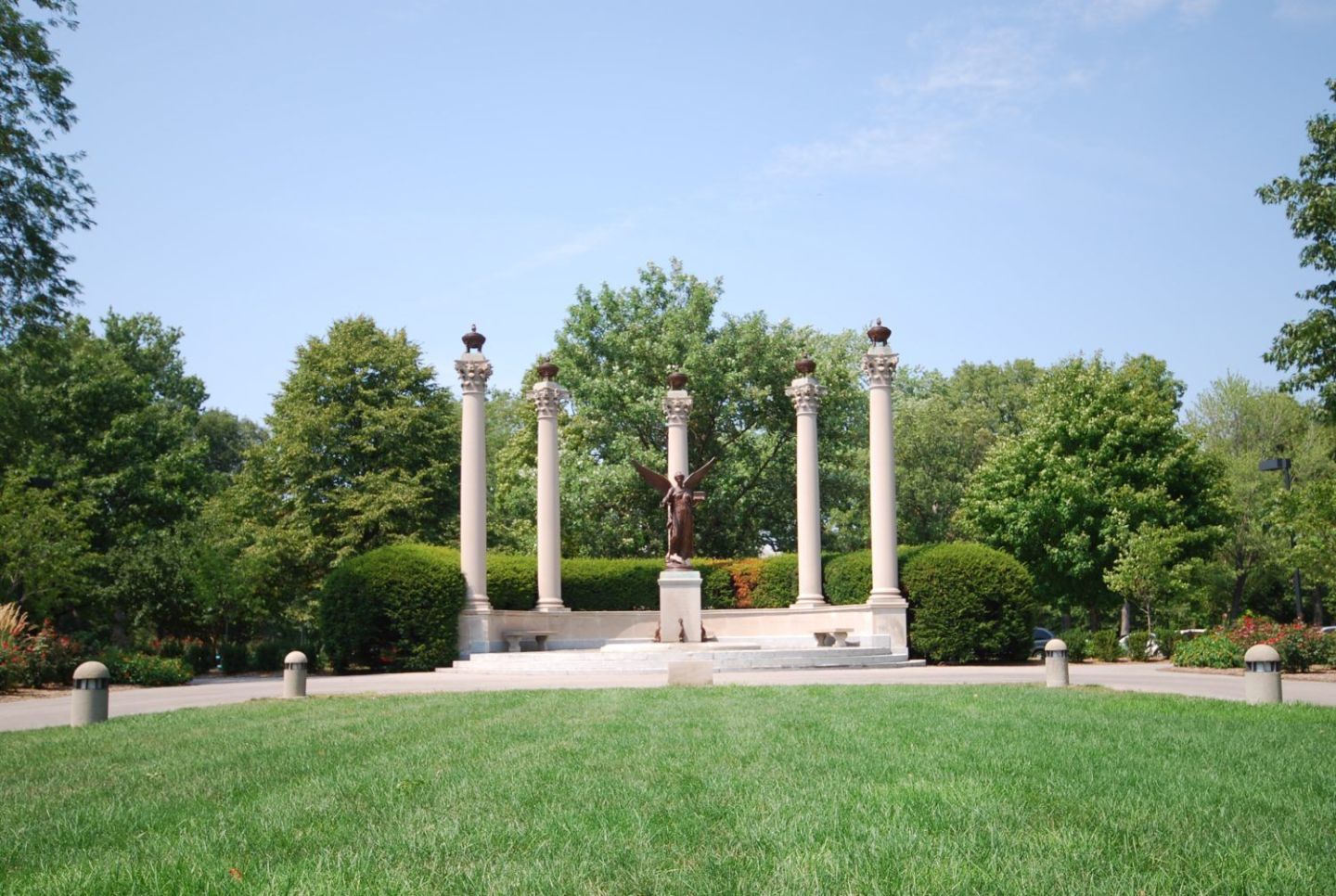
12. Ball State University
San Angelo, TXBall State University doesn’t require applicants to submit GRE scores for its online master’s degree program in nursing. The program offers three tracks: nurse educator, family nurse practitioner, and nurse administration. Prospective students are required to submit three letters of recommendation. Last year, students accepted to this program had a 3.4 undergraduate GPA, on average. The retention rate for the program was 94% in 2021.
| Retention rate | 94% |
| Credits required to graduate | 36 to 47 |
| Acceptance Rate | 68% |
| Enrolled | 119 |
| Tuition | $8,670.00 |
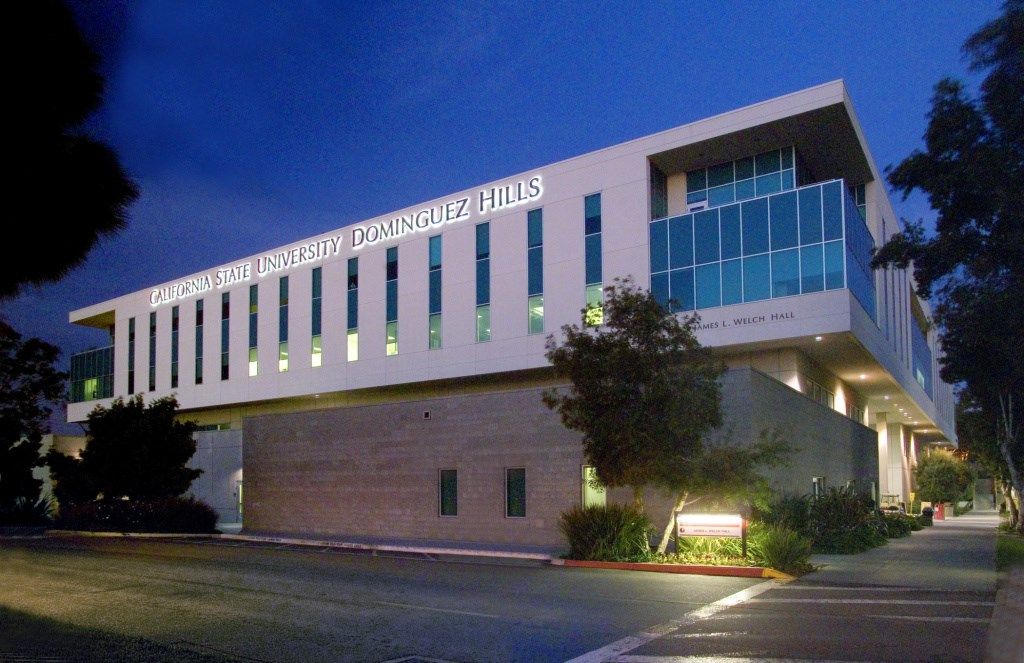
13. California State University--Dominguez Hills
Washington, DCCalifornia State University--Dominguez Hills doesn’t require applicants to submit GRE scores for online master’s degree program in nursing. Prospective students are required to submit three letters of recommendation if they are applying to the family nurse practitioner track. Other tracks don't require recommendation letters. Last year, students accepted to this program had an average undergraduate GPA of 3.5. The retention rate for the program was 83% in 2021.
| Retention rate | 83% |
| Credits required to graduate | 30 to 48 |
| Acceptance Rate | 64% |
| Enrolled | 197 |
| Tuition | $4,965.00 |
Online MS in Nursing From Georgetown University
Earn Your Master’s in Nursing Online From Georgetown University
Nursing@Georgetown delivers Georgetown University’s MS in Nursing program online, preparing RNs with a BSN to pursue certification in an APRN specialty. Students can earn their degree in as few as 23 months.
Jetzt mehr erfahren
14. Angelo State University
San Angelo, TXAngelo State University doesn’t require applicants to submit GRE scores for its online master’s degree program in nursing. Prospective students are required to submit three letters of recommendation and international applicants are required to submit TOEFL scores. Last year, students accepted to this program on average had a 3.453 undergraduate GPA. The graduation rate for the program was 100% in 2021.
| Retention rate | 93% |
| Credits required to graduate | 39 to 49 |
| Acceptance Rate | 93% |
| Enrolled | 67 |
| Tuition | 6241.05 |
15. Baker University
Baldwin City, KSBaker University doesn’t require applicants to submit GRE scores for its online master’s degree program in nursing. The program offers two tracks: education and administration. Prospective students are required to submit two letters of recommendation. Last year, students accepted to this program had an average undergraduate GPA of 3.63. The graduation rate for the program was 90% in 2021.
| Retention rate | 86% |
| Credits required to graduate | 32 |
| Acceptance Rate | 100% |
| Enrolled | 14 |
| Tuition | $480 per credit |

16. King University
Johnson City, TNKing University doesn’t require applicants to submit GRE scores for its online master’s degree program in nursing. Prospective students are required to submit three letters of recommendation and international applicants are required to submit TOEFL scores. Last year, students accepted to this program had an average undergraduate GPA of 3.5. The retention rate for the program was 85% in 2021.
| Retention rate | 85% |
| Credits required to graduate | 35 to 45 |
| Acceptance Rate | 100% |
| Enrolled | 46 |
| Tuition | $10,890.00 |
17. Georgia College & State University
Pittsburgh, PAGeorgia College & State University doesn’t require applicants to submit GRE scores for its online master’s degree program in nursing. Prospective students are required to submit three letters of recommendation. Last year, students accepted to this program had a 3.38 undergraduate GPA, on average. The retention rate for the program was 65.3% in 2021.
| Retention rate | 65% |
| Credits required to graduate | DNP |
| Acceptance Rate | 67.2% |
| Enrolled | 134 |
| Tuition | $473 per credit |

18. Florida Atlantic University
Boca Raton, FLFlorida Atlantic University doesn’t require applicants to submit GRE scores for its online master’s degree program in nursing. Prospective students are required to submit one letter of recommendation. Last year, students accepted to this program had a 3.4 undergraduate GPA, on average. The graduation rate for students within three years of entering the program was 70% in 2021.
| Retention rate | DNP |
| Credits required to graduate | 33 to 37 |
| Acceptance Rate | 43.4% |
| Enrolled | 115 |
| Tuition | $371.82 per credit |
Advance Your Career With Nursing@Simmons
Earn Your MSN and Become an FNP or PMHNP Online From Simmons University
Choose from two program options — FNP or PMHNP — and prepare to raise the standard of patient care. Explore Nursing@Simmons programs for RNs who hold a BSN or bachelor’s degree.
Jetzt mehr erfahren19. Winston-Salem State University
Winston-Salem, NCWinston-Salem State University doesn’t require applicants to submit GRE scores for its online master’s degree program in nursing. Prospective students are required to submit three letters of recommendation and international applicants are required to submit TOEFL scores. Last year, students accepted to this program had a 3.2 undergraduate GPA, on average. The retention rate for the program was 100% in 2021 and students must complete 36 credit hours to graduate.
| Retention rate | 100% |
| Credits required to graduate | 36 |
| Acceptance Rate | 75% |
| Enrolled | 6 |
| Tuition | $3,990.00 |

20. Eastern Kentucky University
Richmond, KYEastern Kentucky University doesn’t require applicants to submit GRE scores for its online master’s degree program in nursing. Prospective students are required to submit three letters of recommendation and international applicants are required to submit TOEFL scores. Last year, students accepted to this program had a 3.29 undergraduate GPA, on average. The retention rate for the program was 74% in 2021.
| Retention rate | 74% |
| Credits required to graduate | 47 |
| Acceptance Rate | 69% |
| Enrolled | 343 |
| Tuition | $11,916.00 |

21. University of Missouri--Kansas City
Kansas City, MOThe University of Missouri--Kansas City doesn’t require applicants to submit GRE scores for its online master’s degree program in nursing. Prospective students are required to submit three letters of recommendation. Last year, students accepted to this program had an average undergraduate GPA of 3.324. The retention rate for the program was 81% in 2021 and students must complete 42 credit hours to graduate.
| Retention rate | 81% |
| Credits required to graduate | 42 |
| Acceptance Rate | 63.3% |
| Enrolled | 286 |
| Tuition | $36,840.00 |

22. Weber State University
Ogden, UTWeber State University doesn’t require applicants to submit GRE scores for its online master’s degree program in nursing. Prospective students aren’t required to submit any letters of recommendation and international applicants are required to submit TOEFL scores. Last year, students accepted to this program had an average undergraduate GPA of 3.4. The retention rate for the program was 90% in 2021.
| Retention rate | 90% |
| Credits required to graduate | 30 to 33 |
| Acceptance Rate | 100% |
| Enrolled | 32 |
| Tuition | $16,108.00 |

23. University of Central Missouri
Warrensburg, MOThe University of Central Missouri doesn’t require applicants to submit GRE scores for its online master’s degree program in nursing. Prospective students aren’t required to submit any letters of recommendation and international applicants are required to submit TOEFL scores. Last year, students accepted to this program had an average undergraduate GPA of 3.63. The retention rate for the program was 81.58% in 2021.
| Retention rate | 82% |
| Credits required to graduate | 33 to 44 |
| Acceptance Rate | 79.1% |
| Enrolled | 170 |
| Tuition | $6,102.00 |
M.S. in Nursing Online at St. John Fisher University
Earn an M.S. in Nursing Online at the Wegmans School of Nursing
Designed for RNs with a bachelor’s degree in nursing and RN license, the online M.S. in Nursing pathway from St. John Fisher University prepares you to pursue licensure as an NP.
Jetzt mehr erfahren24. University of Texas--Tyler
Tyler, TXThe University of Texas--Tyler doesn’t require applicants to submit GRE scores for its online master’s degree program in nursing. Prospective students are required to submit three letters of recommendation and international applicants are required to submit TOEFL scores. Last year, students accepted to this program had a 3.441 undergraduate GPA, on average. The retention rate for the program was 74.8% in 2021 and students must complete 36 credit hours to graduate.
| Retention rate | 75% |
| Credits required to graduate | 36 |
| Acceptance Rate | 71.5% |
| Enrolled | 348 |
| Tuition | $10,968.00 |
25. Thomas Jefferson University
Philadelphia, PAThomas Jefferson University doesn’t require applicants to submit GRE scores for its online master’s degree program in nursing. Prospective students are required to submit two letters of recommendation and international applicants are required to submit TOEFL scores. Last year, students accepted to this program had a 3.5 undergraduate GPA, on average. The retention rate for the program was 98% in 2021 and students must complete 36 credit hours to graduate.
| Retention rate | 98% |
| Credits required to graduate | 36 |
| Acceptance Rate | 86.2% |
| Enrolled | 748 |
| Tuition | $1,200 per credit |

26. Kent State University
Kent, OHKent State University doesn’t require applicants to submit GRE scores for its online master’s degree program in nursing. Prospective students are required to submit three letters of recommendation. Last year, students accepted to this program had a 3.4 undergraduate GPA, on average. The retention rate for the program was 81% in 2021 and students must complete 34 credit hours in this program to graduate.
| Retention rate | 81% |
| Credits required to graduate | 34 |
| Acceptance Rate | 73% |
| Enrolled | 264 |
| Tuition | $623 per credit |

27. Texas A&M International University
Laredo, TXTexas A&M International University doesn’t require applicants to submit GRE scores for its online master’s degree program in nursing. Prospective students are required to submit three letters of recommendation and international applicants are required to submit TOEFL scores. Last year, students accepted to this program had a 3.0 undergraduate GPA, on average. The retention rate for the program was 87% in 2021 and students must complete 48 credit hours to graduate.
| Retention rate | 87% |
| Credits required to graduate | 48 |
| Acceptance Rate | 68.3% |
| Enrolled | 7 |
| Tuition | $60,232.32 |

28. University of Louisiana–Monroe
Monroe, LAThe University of Louisiana--Monroe doesn’t require applicants to submit GRE scores for its online master’s degree program in nursing unless the applicant’s undergraduate GPA is lower than 2.8. Prospective students aren’t required to submit any letters of recommendation and international applicants are required to submit TOEFL scores. Last year, students accepted to this program had a 3.07 undergraduate GPA, on average. The retention rate for the program was 92% in 2021.
| Retention rate | 92% |
| Credits required to graduate | 38 |
| Acceptance Rate | 64% |
| Enrolled | 30 |
| Tuition | $365.79 per credit |
Online MS in Nursing From Georgetown University
Earn Your Master’s in Nursing Online From Georgetown University
Nursing@Georgetown delivers Georgetown University’s MS in Nursing program online, preparing RNs with a BSN to pursue certification in an APRN specialty. Students can earn their degree in as few as 23 months.
Jetzt mehr erfahren
29. University of St. Francis
Joliet, ILThe University of St. Francis doesn’t require applicants to submit GRE scores for its online master’s degree in nursing program. Prospective students are required to submit two letters of recommendation and international applicants are required to submit TOEFL scores. Last year, students accepted to this program had an average undergraduate GPA of 3.3. The retention rate for the program was 78% in 2021 and students must complete 36 credit hours to graduate.
| Retention rate | 78% |
| Credits required to graduate | 36 |
| Acceptance Rate | 35% |
| Enrolled | 168 |
| Tuition | $775 per credit |

30. Clayton State University
Morrow, GAClayton State University doesn’t require applicants to submit GRE scores for its online master’s degree program in nursing. Prospective students are required to submit three letters of recommendation and international applicants are required to submit TOEFL scores. Last year, students accepted to this program had an average undergraduate GPA of 3.36. The retention rate for the program was 55% in 2021.
| Retention rate | 55% |
| Credits required to graduate | 47 |
| Acceptance Rate | 57.1% |
| Enrolled | 29 |
| Tuition | $9,854.00 |
31. University of South Carolina--Upstate
Spartanburg, SCUniversity of South Carolina--Upstate doesn’t require applicants to submit GRE scores for its online master’s degree program in nursing. Prospective students are required to submit three letters of recommendation and international applicants are required to submit TOEFL scores. Last year, students accepted to this program had a 3.5 undergraduate GPA, on average. Students must complete 38 credit hours to graduate.
| Retention rate | DNP |
| Credits required to graduate | 38 |
| Acceptance Rate | 100% |
| Enrolled | 24 |
| Tuition | $572 per credit |
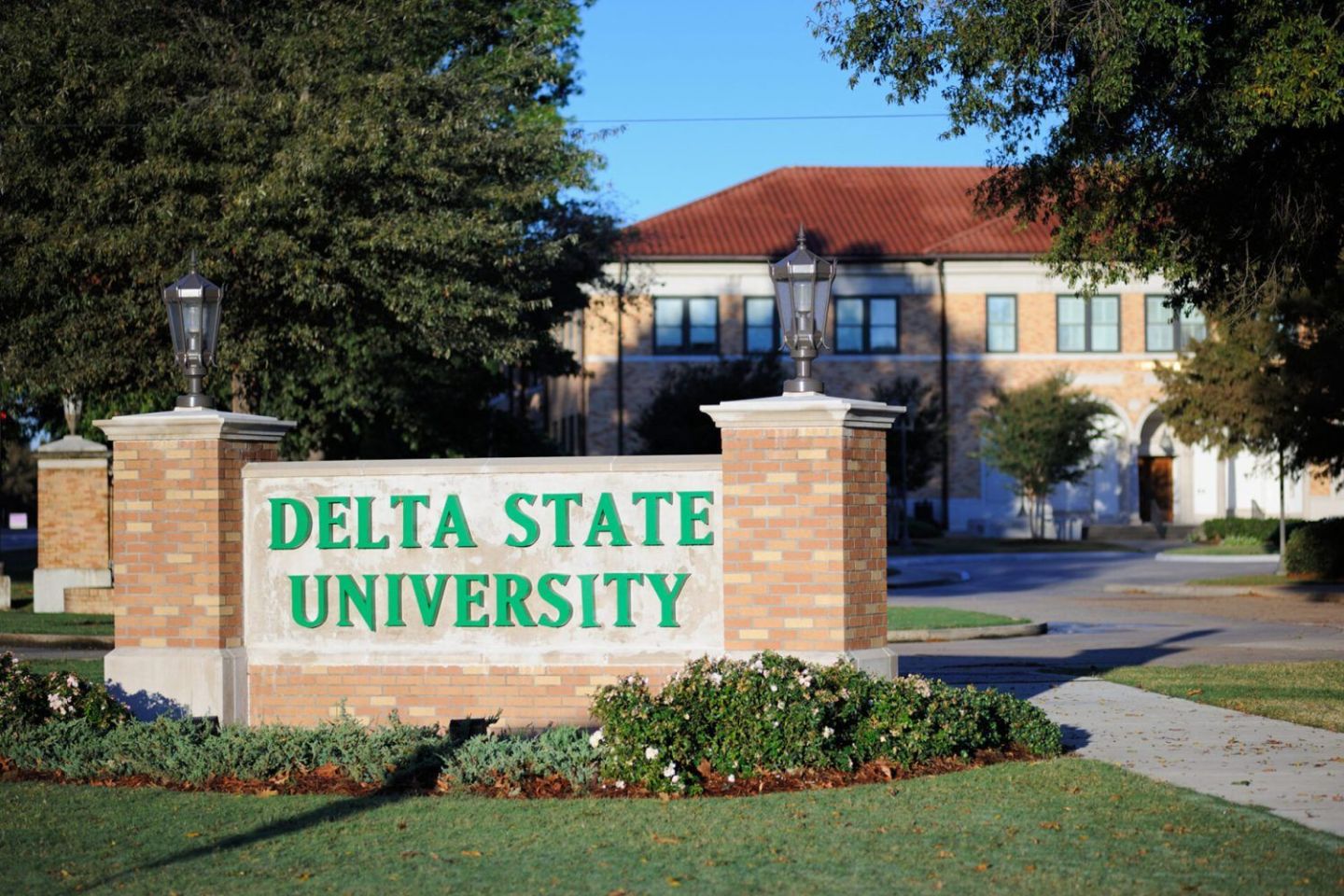
32. Delta State University
Charlotte, NCDelta State University doesn’t require applicants to submit GRE scores for its online master’s degree program in nursing. Prospective students aren’t required to submit any letters of recommendation and international applicants are required to submit TOEFL scores. Last year, students accepted to this program had a 3.46 undergraduate GPA, on average. The retention rate for the program was 77% in 2021.
| Retention rate | 77% |
| Credits required to graduate | 49 |
| Acceptance Rate | 100% |
| Enrolled | 19 |
| Tuition | $4,217.50 |

33. Rush University
Chicago, ILRush University doesn’t require applicants to submit GRE scores for its online master’s degree program in nursing. Prospective students are required to submit three letters of recommendation and international applicants are required to submit TOEFL scores. Last year, students accepted to this program had an average undergraduate GPA of 3.289. Students must complete 37 credit hours and 400 clinical hours to graduate.
| Retention rate | 74% |
| Credits required to graduate | 37 |
| Acceptance Rate | 77% |
| Enrolled | 45 |
| Tuition | $22,644.00 |
Advance Your Career With Nursing@Simmons
Earn Your MSN and Become an FNP or PMHNP Online From Simmons University
Choose from two program options — FNP or PMHNP — and prepare to raise the standard of patient care. Explore Nursing@Simmons programs for RNs who hold a BSN or bachelor’s degree.
Jetzt mehr erfahren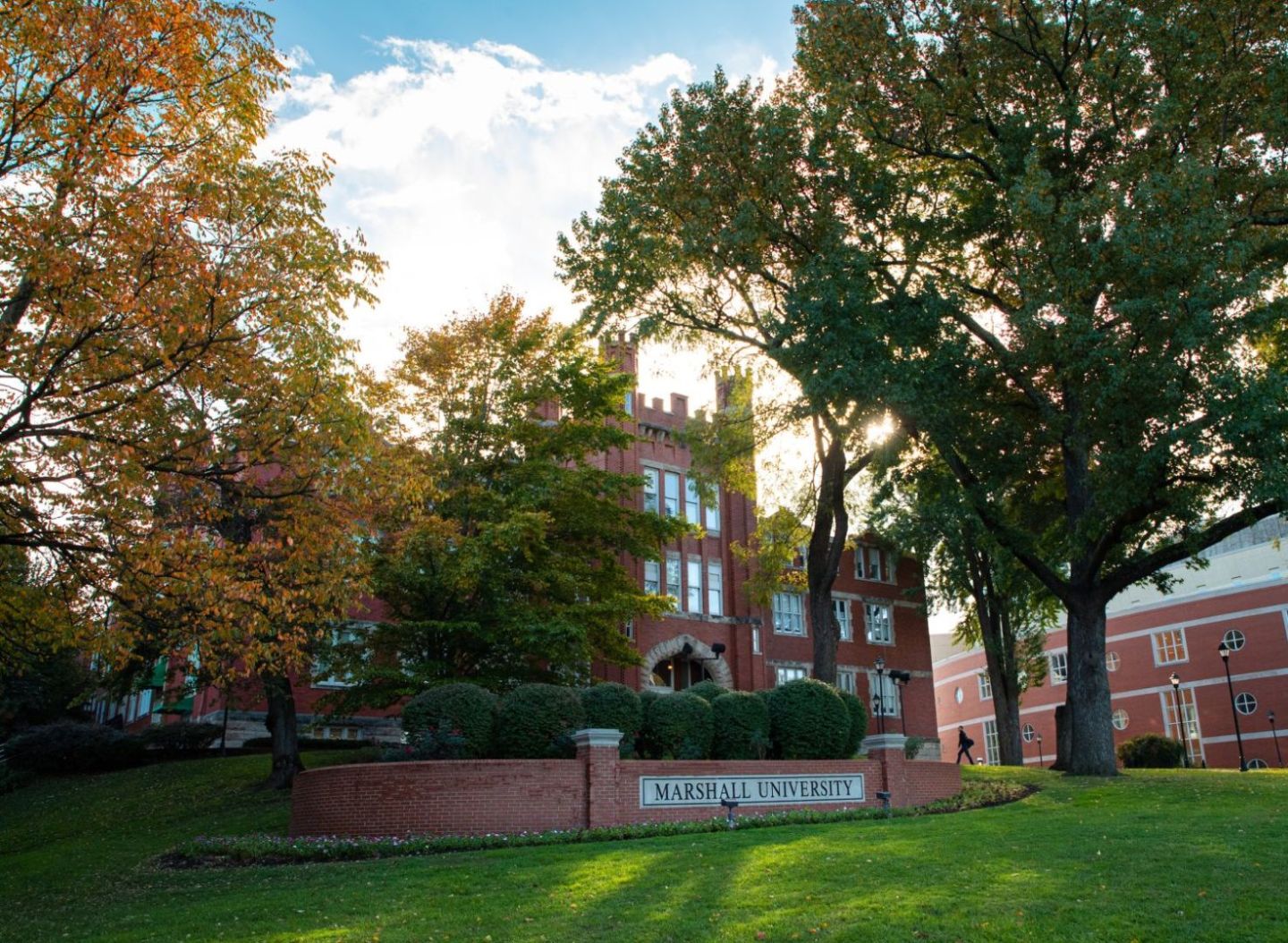
34. Marshall University
Huntington, WVMarshall University doesn’t require applicants to submit GRE scores for its online master’s degree program in nursing. Prospective students aren’t required to submit any letters of recommendation and international applicants aren’t required to submit TOEFL scores. The retention rate for the program was 100% in 2021 and students must complete 36 credit hours in this program to graduate.
| Retention rate | 100% |
| Credits required to graduate | 36 |
| Acceptance Rate | 95% |
| Enrolled | 20 |
| Tuition | $8,882.00 |

35. University of Hartford
West Hartford, CTThe University of Hartford doesn’t require applicants to submit GRE scores for its online master’s degree program in nursing. Prospective students are required to submit two letters of recommendation and international applicants are required to submit TOEFL scores. The retention rate for the program was 85% in 2021 and students must complete 34 credit hours to graduate.
| Retention rate | 85% |
| Credits required to graduate | 34 |
| Acceptance Rate | 91.5% |
| Enrolled | 101 |
| Tuition | $685 per credit |

36. Troy University
Troy, ALTroy University doesn’t require applicants to submit GRE scores for its online master’s degree program in nursing. Prospective students are required to submit two letters of recommendation and international applicants are required to submit TOEFL scores. Last year, students accepted to this program had an average undergraduate GPA of 3.258. The retention rate for the program was 82% in 2021 and students must complete 37 credit hours to graduate.
| Retention rate | 82% |
| Credits required to graduate | 37 |
| Acceptance Rate | 99% |
| Enrolled | 181 |
| Tuition | $14,820 |

37. University of Massachusetts--Dartmouth
Dartmouth, MAThe University of Massachusetts--Dartmouth doesn’t require applicants to submit GRE scores for its online master’s degree program in nursing. Prospective students are required to submit two letters of recommendation and international applicants are required to submit TOEFL scores. Last year, students accepted to this program had a 3.48 undergraduate GPA, on average. The retention rate for the program was 65% in 2021 and students must complete 39 credit hours to graduate.
| Retention rate | 65% |
| Credits required to graduate | 39 |
| Acceptance Rate | 94% |
| Enrolled | 48 |
| Tuition | $7,896.00 |

38. Carson-Newman University
Muncie, INCarson-Newman University doesn’t require applicants to submit GRE scores for its online master’s degree program in nursing unless the applicant’s undergraduate GPA is lower than 3.0. Prospective students are required to submit three letters of recommendation and international applicants aren’t required to submit TOEFL scores. Last year, students accepted to this program had a 3.0 undergraduate GPA, on average. The retention rate for the program was 90% in 2021.
| Retention rate | 90% |
| Credits required to graduate | 46 |
| Acceptance Rate | 100% |
| Enrolled | 322 |
| Tuition | $29,250.00 |
Online MS in Nursing From Georgetown University
Earn Your Master’s in Nursing Online From Georgetown University
Nursing@Georgetown delivers Georgetown University’s MS in Nursing program online, preparing RNs with a BSN to pursue certification in an APRN specialty. Students can earn their degree in as few as 23 months.
Jetzt mehr erfahren
39. Northwest University
Kirkland, WANorthwest University doesn’t require applicants to submit GRE scores for its online master’s degree program in nursing. Prospective students are required to submit one letter of recommendation and international applicants aren’t required to submit TOEFL scores. Last year, students accepted to this program had a 3.69 undergraduate GPA, on average. The retention rate for the program was 50% in 2021 and students must complete 36 credit hours to graduate.
| Retention rate | 50% |
| Credits required to graduate | 36 |
| Acceptance Rate | 83% |
| Enrolled | 6 |
| Tuition | $10,710.00 |

40. University of Arkansas
Fayetteville, ARThe University of Arkansas doesn’t require applicants to submit GRE scores for its online master’s degree program in nursing. Prospective students are required to submit one letter of recommendation. The retention rate for the program was 75% in 2021 and students must complete 39 credit hours to graduate.
| Retention rate | 75% |
| Credits required to graduate | 39 |
| Acceptance Rate | DNP |
| Enrolled | 32 |
| Tuition | DNP |

41. Minnesota State University--Moorhead
Moorhead, MNMinnesota State University--Moorhead doesn’t require applicants to submit GRE scores for its online master’s degree program in nursing. Prospective students aren’t required to submit references. The retention rate for the program was 89.5% in 2021.
| Retention rate | 90% |
| Credits required to graduate | 41 |
| Acceptance Rate | 96.4% |
| Enrolled | 51 |
| Tuition | $578.66 per credit |

42. Kennesaw State University
Kennesaw, GAKennesaw State University doesn’t require applicants to submit GRE scores for its online master’s degree program in nursing. Prospective students are required to submit two letters of recommendation and international applicants are required to submit TOEFL scores. Last year, students accepted to this program had an average undergraduate GPA of 3.3. Students must complete 40 credit hours in this program to graduate.
| Retention rate | DNP |
| Credits required to graduate | 40 |
| Acceptance Rate | DNP |
| Enrolled | 24 |
| Tuition | $10,341.00 |
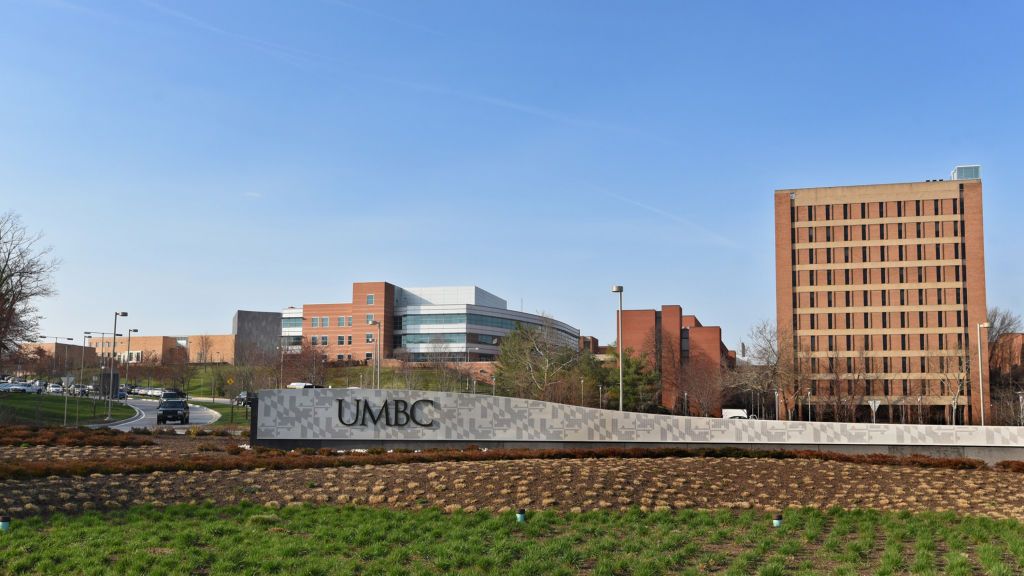
43. University of Maryland--Baltimore
Baltimore, MDThe University of Maryland--Baltimore doesn’t require applicants to submit GRE scores for its online master’s degree program in nursing. Prospective students are required to submit one letter of recommendation and international applicants are required to submit TOEFL scores. The retention rate for the program was 84.92% in 2021.
| Retention rate | 85% |
| Credits required to graduate | 38 |
| Acceptance Rate | 88.5% |
| Enrolled | 286 |
| Tuition | $840 per credit |

44. Saint Joseph's College of Maine
Orlando, FLSaint Joseph's College of Maine doesn’t require applicants to submit GRE scores for its online master’s degree program in nursing. Prospective students are required to submit three letters of recommendation and international applicants are required to submit TOEFL scores. The retention rate for the program was 60.1% in 2021 and students must complete 36 credit hours to graduate.
| Retention rate | 60% |
| Credits required to graduate | 42 to 48 |
| Acceptance Rate | 54% |
| Enrolled | 156 |
| Tuition | $28,686.00 |
Advance Your Career With Nursing@Simmons
Earn Your MSN and Become an FNP or PMHNP Online From Simmons University
Choose from two program options — FNP or PMHNP — and prepare to raise the standard of patient care. Explore Nursing@Simmons programs for RNs who hold a BSN or bachelor’s degree.
Jetzt mehr erfahrenWhat is an online master’s in nursing (MSN)?
An online master’s in nursing, or MSN (master of science in nursing), is a graduate-level degree that’s designed to help nurses advance their careers. Graduates of MSN programs may go on to roles as advanced nurse practitioners, the fastest-growing occupation in the U.S., along with other types of leadership, managerial, or director positions. Master’s degree programs in nursing are offered both online and on-campus, though there’s typically no significant difference beyond the format—rather, students can expect to be offered the same classes taught by the same professors. Accredited online programs typically incorporate an in-person, clinical experience into the curriculum and often help students secure these placements.
General curriculum and skills taught
Students who enroll in an MSN program will be required to complete a curriculum that meets the essential core competencies as identified by the American Association of Colleges of Nursing. As a result, there will be commonalities in the core curriculum at various MSN programs— regardless of whether these programs are offered in-person, online, part-time, full-time, or a hybrid model. For example, at the University of Nevada–Las Vegas, the top-ranked MSN program on Fortune’s ranking, the following courses constitute the core curriculum:
- Advanced health assessment
- Advanced pathophysiology and genetics
- Nursing theory and research
- Informatics and quality improvement
- Health and public policy for advanced practice of nursing
- Advanced pharmacology and genetics
Specialization and program options
Beyond the core curriculum, students in MSN programs can expect to take additional courses that align with their chosen major or specialization. While the range of possible concentrations vary by program, some of the most common ones include:
- Family nurse practitioner
- Psychiatric mental health nurse practitioner (PMHNP)
- Nurse educator
- Public health
- Clinical nurse leader
- Certified nurse midwifery
Admissions information
Admissions requirements for master’s degree programs in nursing can vary by school and an applicant’s relevant work experience. In light of the nation’s nursing shortage, MSN programs may be more willing to accept a broader pool of applicants—and, in fact, being a registered nurse (RN) may not be a fixed requirement for some programs, depending on what path you want to pursue in the field of nursing. That said, MSN students typically come from one of four different backgrounds, according to the American Association of Colleges of Nursing:
- BSN-to-MSN: This type of program is the most common and builds on undergraduate-level nurse education so students can specialize in a specific area of health care, such as nurse education, nurse informatics, or public health nursing.
- Entry-level master’s program: This program is aimed at individuals with a degree in a field other than nursing, and covers material taught during a bachelor’s program in two or three years with students usually obtaining their RN within the first year.
- ADN-to-MSN: This program allows RNs who have obtained only an associate’s degree in nursing (ADN) to work during their first year, before moving to more advanced topics and specializations.
- Dual-degree programs: Dual-degree programs allow nurses to obtain additional specialization in fields outside of nursing. Common pairings with an MSN include a master’s degree in public health, a master’s of health administration, an MBA, or a master’s degree in public administration.
No matter which route you take to completing an MSN degree and the experience you bring, you will need to ensure you satisfy the application requirements. Online MSN programs generally require the following:
- Successful completion of a bachelor’s degree, as demonstrated by an official transcript
- Résumé that demonstrates relevant academic or professional experience
- A compelling personal statement or essay that demonstrates your understanding of the degree and connects your unique characteristics to your career goals after completing the MSN degree program
- Letters of recommendation from supervisors, professors or alumni of the program
- Proof of current status as a U.S. licensed registered nurse (RN)
GMAT, GRE and GPA
Standardized test scores aren’t integral to the decision process for a majority of online master’s degree programs in nursing. In fact, only one of the 44 programs on Fortune’s 2022 ranking require applicants to submit a GRE score to be considered for admission. Similarly, these programs don’t require a minimum GPA for admission, though a majority of schools reported that incoming students had an average GPA of at least 3.0.
Which factors drive acceptance?
Admissions officials consider a variety of factors when making enrollment decisions for MSN programs. Students need to be “academically strong and achievement-oriented” as the dean of the nursing program at the University of Pittsburgh told Fortune. The top-ranked nursing programs also weigh leadership potential and an applicant’s intentions for pursuing this graduate degree. Because schools want to get a holistic sense of applicants, it’s important to use the essays and interviews to focus on crafting a compelling story about your qualifications and your post-graduation career aspirations.
Why get an MSN?
Many people who pursue a career in nursing are drawn to the field by a sense of altruism and the opportunity to make a difference in their local communities. Pursuing an MSN degree can offer other advantages, including opening the door to more advanced nursing opportunities that often come with substantial salary increases. For example, you will need an advanced degree—such as an MSN—to qualify to become an advanced nurse practitioner. This role is the fastest-growing job in the U.S., according to the Bureau of Labor Statistics, and advanced nurse practitioners can earn a median salary of more than $120,000.
Career outlook for master’s in nursing graduates
Completing a master’s degree in nursing will qualify you for more advanced-level positions that are also high-paying and in high demand. Some of the popular career paths for MSN graduates include:
- Advanced practice registered nurses (APRN): Nurse practitioners, nurse anesthetists, and nurse midwives—roles that typically require an MSN degree—pay median salaries of more than $123,000.
- Family nurse practitioners: These nurses, who can diagnose and manage acute, chronic, and complex health problems, earn average salaries of more than $105,000.
- Psychiatric mental health nurse practitioners: These nurses manage mental health care and can prescribe medications and offer therapy services. These roles have average salaries of more than $139,000.
- Nursing education or nursing administration: These roles prepare students to teach or lead other nurses, and both roles command salaries of at least $90,000.
How to choose the best online master’s in nursing for you
Pursuing your master’s degree in nursing online offers more flexibility than an in-person program—but with the same rigor, guidance, and curricula that’s required for licensure. Fortune’s ranking of online master’s degree programs in nursing can be a helpful way to compare various programs. Our ranking is based on three components: selectivity, success (as measured by one-year retention and graduation rates), and demand.
There are many practical factors to consider when applying to school including cost, a program’s prestige, the amount of experience schools require of applicants, and how school will fit into the rest of your life. You should also think carefully about how various MSN programs will help you to achieve your career goals, including the specializations offered. What’s more, because many MSN programs include an in-person clinical placement, the location of the school may factor into your choice of program. Finally, you may need to consider the school’s location. UNLV can’t accept students from all states for a variety of regulatory reasons—and, for example, the school’s family nurse practitioner and psychiatric mental health nurse practitioner tracks are unable to admit students from California.
Start times, schedule, and program length
Many students who enroll in online MSN programs continue to work full- or part-time, so it can take up to three years to complete graduate school. While flexibility is a chief reason why online programs are appealing, there isn’t so much flexibility with respect to start dates. The top 2 ranked schools on Fortune’s ranking—UNLV and Ohio State—offer only one start date each year for their MSN programs. That’s why it’s important to consider your schedule and work demands before applying to schools.
Program options and specialties
One reason why many nurses go on to pursue an advanced degree is to move into a more specialized area of practice. Because there are several types of master’s degrees in nursing, along with different format options and specialties, it’s really important to think about how an MSN program will help you to achieve your career goals. If you are interested in a program that has a nurse practitioner concentration, for example, Fortune created a ranking of the best online nurse practitioner programs for 2023.
Accreditation by CCNE
You may want to check whether an MSN program you’re considering is accredited by the Commission on Collegiate Nursing Education (CCNE). This independent agency ensures the quality and integrity of nursing programs, including online master’s degree programs in nursing. Some states or employers may require nurses to hold a degree from a CCNE-accredited school.
Clinical hour experience
As part of your selection process for an online MSN program, you will need to consider what in-person, clinical experiences may be offered. For example, UNLV’s family nurse practitioner and psychiatric mental health nurse practitioner tracks both have clinical components to them. The opportunity to work directly with patients in clinical settings may influence your choice of programs. Clinical hour requirements vary across specialty programs, as well. Students enrolled in the MSN program at Georgetown University, for example, must complete a minimum of 650 clinical hours for the family nurse practitioner program, while the women’s health nurse practitioner requires at least 1,000 hours.
Cost
Even with the potential for earning a higher salary after graduation, the cost of a master’s degree program in nursing is an important factor to consider when applying to school. Tuition varies widely, with the cost of an MSN program ranging from $35,000 to $70,000, though some schools are closer to $100,000. If cost is a key decision factor for you, be sure to consult Fortune’s list of some of the most affordable MSN programs or our ranking of the most affordable MSN nurse practitioner programs when making selection decisions.
Immersive experiences (on-campus visits)
Some programs incorporate immersive, on-campus experiences into an online program—beyond any clinical requirements. These experiences may be appealing if you are hesitant about attending classes online, want the opportunity to network in-person, or are considering a school that’s in close proximity to where you live. That said, some students may find completely online programs to be more convenient—and particularly if they select a school that’s not nearby.
Financing and scholarships
The cost of attending an MSN program can be substantial, though there are a variety of scholarships and grant options that can help defray the cost for current students. What’s more, there are loan repayment programs that may help graduates of nursing degree programs. Some examples of financing and scholarship opportunities include:
- The Air Force Health Professions scholarship program is designed for nurses seeking a graduate degree who want to become a nurse practitioner. The Air Force covers tuition and book fees and provides the scholarship winner with a monthly stipend—amounting to up to $45,000 per year. In return, students will commit to serve as active duty in the Air Force, serving one year for every one year of scholarship.
- The Tylenol Future Care scholarship awards 35 scholarships to students pursuing an advanced degree in health care; 10 scholarships in the amount of $10,000 and 25 scholarships for $5,000. Applicants must be a U.S. resident and a graduate student or college senior enrolling in a graduate program.
- Nurses Educational Funds scholarships are available to students who are a member of a national professional nursing association and are pursuing a master’s degree in nursing. Scholarship amounts range. All applicants need to have at least two semesters of study remaining after being notified about winning an award.
- The Nurse Corps Loan repayment program covers up to 85% of unpaid nursing education debt for registered nurses, advanced practice registered nurses, and nurse faculty. Award recipients must work for two years in a critical shortage facility or an eligible nursing school as nurse faculty.
- The Indian Health Service helps clinicians repay their eligible education loans in exchange for two years of service in health facilities serving American Indian and Alaska Native communities. The IHS will pay up to $40,000, and nurses don’t need to be of American Indian or Alaska Native heritage to qualify.
Licensure, certifications, and continuing education
You should count on needing a current registered nurse (RN) license as a prerequisite when enrolling to master’s degree programs in nursing. Depending on the specialty you choose to pursue, you will need to successfully complete other certifications. You will need national and state certification in your chosen specialty to practice as an advanced practice registered nurse, though some grads of MSN programs may not require additional certification. The American Nurses Credentialing Center (ANCC), the largest credentialing organization for nurses, offers 18 different certifications that include nurse practitioners. Other credentialing organizations, such as the American Association of Critical-Care Nurses, offer more specialized certification programs.
Your education doesn’t end with a degree, licensure, or certification, however. You will need to stay up-to-date in your field with continuing education and will need to renew your license and certifications, as dictated by your employer or state laws. Finally, if you plan to move—such as becoming a travel nurse—you should check to see if you’re licensed in a state that is part of the Nurse Licensure Compact (NLC), which allows nurses to practice in other NLC states without receiving additional licenses.
Frequently Asked Questions
There are several types of nursing degrees and specializations, beyond a master’s of science in nursing (MSN). The range of options include MSNs with specializations in forensic nursing, public health, nursing education, and nursing administration and management. In terms of degrees, there are also master’s degree programs dedicated to the learning and training required to become a nurse practitioner, a clinical nurse specialist, or a certified nurse midwife.
The best master’s degree for you depends on what you hope to accomplish in the future. For example, if you’re looking to promote community health, curb the spread of diseases and infections, and make public health information more accessible, an MSN program with a concentration in public health might be best for you. Meanwhile, if you’re looking to move up in a current nursing position, an MSN that focuses on management and administration would help obtain leadership roles. It’s important to look at a program’s accreditation and clinical site placements, along with whether you want to complete the degree online or in-person when choosing the best way to further your nursing education and career.
Right now, there’s robust demand for nurses who have earned a master’s degree, and with higher demand comes a higher salary. Nursing roles that require an advanced degree—such as nurse anesthetists, nurse midwives, and nurse practitioners—earned a median pay of nearly $124,000, according to 2021 figures from the Bureau of Labor Statistics. And nursing salaries are projected to continue rising in 2022 and beyond. Roles that require an MSN typically pay more than those only requiring a bachelor’s degree, such as a registered nurse (RN). There’s also very high demand for opportunities in the industry beyond traditional nursing roles, including nursing educators, who are responsible for teaching future nursing students.
Nurses are generally paid well, granted they work extremely hard and are at the frontlines when viruses or diseases hit, as we saw with the COVID-19 pandemic. A master of science in nursing increases base pay for nurses—and obtaining this degree also gives nurses more leeway when applying for management positions and pursuing other paths in the health care industry. The value of the degree comes mostly from the work that can be done with it, like making a difference helping the people around you.
No. An MSN is a master of science degree in nursing, whereas an RN is a registered nurse designation. These are two separate levels of nursing that require different levels of education. RNs must earn a bachelor’s degree and become licensed—and licensing requirements vary by state. Nurses with MSN degrees have completed a graduate program in nursing, and can pursue different tracks depending on prior experience. As a result, that means you don’t necessarily need to be an RN to pursue a master’s degree in nursing.
Most master’s degree programs in nursing take anywhere from one to three years to complete. However, length of time varies because it is dependent on an individual student’s schedule. That means students who chose to work while obtaining their degree might take longer to complete their program than students who are full-time. A lot of people working toward their master’s in nursing are already working in health care, and their experience can be counted toward credits needed to complete the program. Because going back to school will add more work and stress to your life, you may want to think carefully about when is the best time to pursue an MSN.
An MSN will qualify you for hirer paying jobs, often in excess of $100,000. For example, family nurse practitioners can earn an average salary of $105,000 and psychiatric mental health nurse practitioners can earn an average salary of $139,000, according to experts—and both roles require advanced nursing degrees. What’s more, students who earn an MSN with a concentration in nursing education or nursing administration can make almost six-figure salaries, on average.
The cost of a master’s degree in nursing can range from $35,000 to $70,000, although some programs cost as much as $100,000, according to estimates by NurseJournal. But don’t stress just yet: Some programs offer scholarships and grants to help offset the cost. Even so, the cost is something to consider when evaluating various MSN programs. For example, Texas A&M International University tuition costs around $60,000, which compares to about $22,000 at Rush University, and approximately $5,000 at the University of Central Florida.



